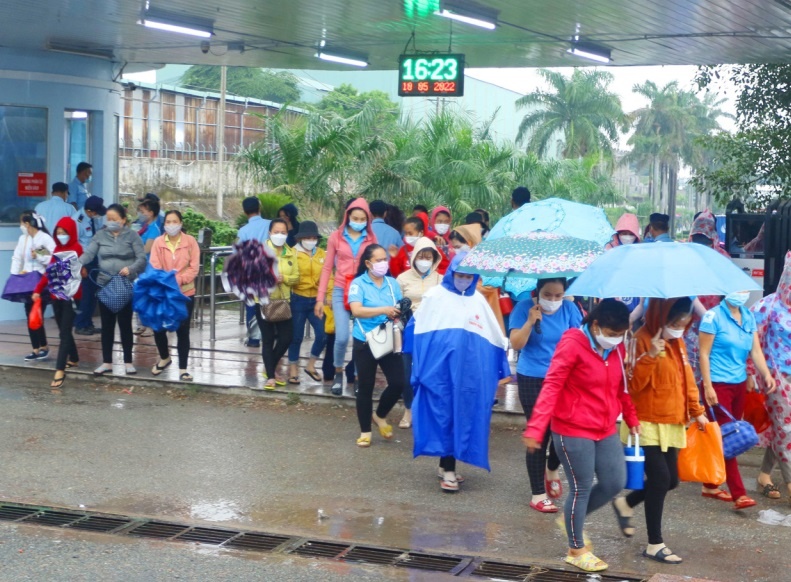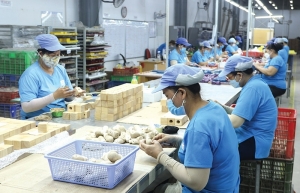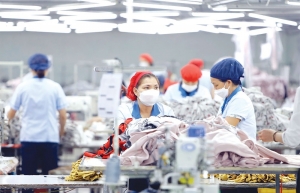High informal worker figures pose issue for prosperity goals
 |
| Many workers in the country have weak contracts, or none at all, photo Le Toan |
According to an overview report of informal employment in Vietnam from the General Statistics Office (GSO) released last week, in 2021, there were 33.6 million workers in informal employment, equivalent to 68.5 per cent of the total of employed workers.
“This is still a high rate compared to many countries in the world,” said Ingrid Christensen, director of the International Labour Organization (ILO) in Vietnam. “One of the most important things for poverty reduction in Vietnam is to ensure quality of employment, especially decent work.”
The majority of Vietnamese workers still accept vulnerable jobs, without social insurance contributions or contracts. In informal employment, workers without legal or social protection are vulnerable to economic risks. And informal employees, even in the formal sector, are not regulated by labour regulations, taxes, social security, or other employment regimes.
According to the GSO report, out of the 33.6 million workers in informal employment, most of them were working in the informal sector (81.8 per cent), which includes production and businesses providing materials and services for sale or exchange without business registration. In the formal sector, where operators are required to register their business and operations, perform tax declaration obligations, and provide social welfare for employees, there were 6 million informal workers, accounting for 17.8 per cent of the total number of informal workers in the country.
Rural areas are more vulnerable than urban areas, with nearly three-quarters of Vietnam’s informal workers residing here. According to the GSO report, in rural areas, about 78 out of every 100 working people are informal workers, while this figure is only 52 in urban areas. Around 24 million informal workers are in rural areas, accounting for 72 per cent of the total.
Informal workers are characterised by low levels of expertise. About 87 per cent of informal workers do not receive specialised training and 35 per cent are in occupations like freelancers, and staff in small shops, eateries, or other household businesses. But the report notes that as many as 16 per cent of informal workers have a university degree or higher.
There is a positive relationship between the proportion of informal workers and the proportion of labours in the agro-forestry-fishery sector and the poverty rate of the provinces. Provinces that have a high proportion of poor households, as well as a high proportion of workers in agro-forestry-fishery, have a high proportion of informal workers.
The income from the main job of informal workers in 2021 was VND4.4 million ($190), only half of the income of formal workers VND8.2 million ($355). Nearly half of informal workers earn less than the regional minimum wage, while the hourly underemployment rate of informal workers is much higher than that of formal workers, the GSO said.
A developed and sustainable economy cannot rely on the labour market with a high rate of informality, experts emphasised. “For many years, the Vietnamese government has always made efforts to develop the economy and formalise workers in informal employment to ensure decent jobs for workers,” said Nguyen Trung Tien, deputy director general of the GSO.
However, reducing informal employment is still a headache for policymakers. They are struggling with the transition of workers from informal employment to those formal jobs, to improve the quality of life for the vulnerable informal workers and contribute to becoming a powerful country with a high middle income.
“The transition from the informal to the formal sector is not only a challenge for Vietnam but also a common concern over the world with 50 per cent of informal employment, and it is also a problem for the ASEAN region,” said Christensen from ILO Vietnam.
In the view of economic expert Le Duy Binh, the approach to informal employment also needs to be changed. The first step is to attract informal workers to participate in social insurance (more important than labour contracts). At present, only a small percentage (2.1 per cent) of informal workers participate in voluntary social insurance. The remainder does not have any insurance, which will cause consequences for social security in the future.
“In the short term, it is necessary to formalise informal labour by participating in social insurance to protect workers’ rights. In the medium and long term, policies and regulations need to be revised to encourage and facilitate the informal sector to follow the standards of the formal sector and become formal,” proposed Binh.
He said that the expansion of formal labour and the expansion of social insurance also requires the participation of other laws such as the Law on Taxation, and the Law on Enterprises, in addition to the Labour Code and Law on Social Insurance, while it is also necessary to develop enterprises in the formal sector, and more and more new businesses to be established and registered.
 | Foreign groups battle to retain their workers Offering a less attractive salary and welfare package is one of the reasons why many foreign-invested enterprises in industrial zones cannot retain local workers, some of who are going to desperate lengths to get by financially. |
 | Returning workers yearn for new support More businesses are being encouraged to create training programmes before and after sending Vietnamese workers overseas, in order for human resources potential to not be wasted on their return. |
What the stars mean:
★ Poor ★ ★ Promising ★★★ Good ★★★★ Very good ★★★★★ Exceptional
Related Contents
Latest News
More News
- A golden time to shine within ASEAN (February 19, 2026 | 20:22)
- Vietnam’s pivotal year for advancing sustainability (February 19, 2026 | 08:44)
- Strengthening the core role of industry and trade (February 19, 2026 | 08:35)
- Future orientations for healthcare improvements (February 19, 2026 | 08:29)
- Infrastructure orientations suitable for a new chapter (February 19, 2026 | 08:15)
- Innovation breakthroughs that can elevate the nation (February 19, 2026 | 08:08)
- ABB Robotics hosts SOMA Value Provider Conference in Vietnam (February 19, 2026 | 08:00)
- Entire financial sector steps firmly into a new spring (February 17, 2026 | 13:40)
- Digital security fundamental for better and faster decision-making (February 13, 2026 | 10:50)
- Aircraft makers urge out-the-box thinking (February 13, 2026 | 10:39)

 Tag:
Tag:













 Mobile Version
Mobile Version